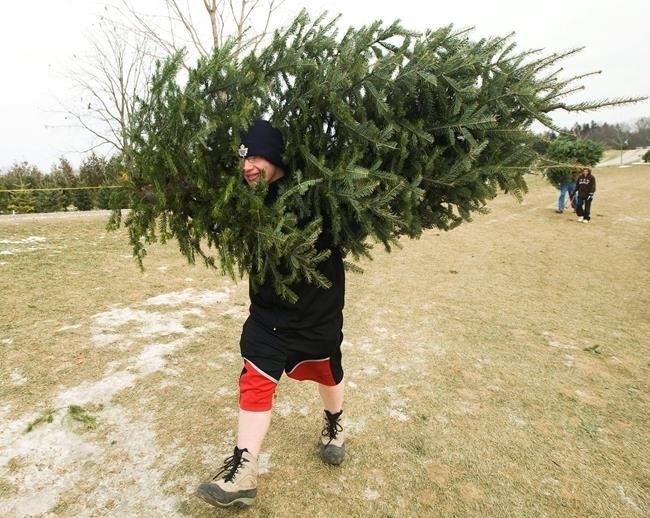
A person carries his Christmas tree that he cut down at Will's Christmas Store and Tree Farm in Lynden, Ont., on Saturday, December, 13, 2008.
Image Credit: THE CANADIAN PRESS/Nathan Denette
December 01, 2022 - 9:00 PM
Anyone looking for that perfect Christmas tree will probably notice the 10 per cent price increase from last year, but they're less likely to see what's behind it: an industry at a turning point.
Christmas tree stock has been declining for four or five years now. A tree takes about a decade to reach maturity, and the closure of tree farms in Canada and the U.S. during the Great Recession in 2008-09 — and the resultant lack of plants ready to go 10 or 12 years later — is now being felt.
In the meantime, the number of farms is dwindling and the effects of climate change have hindered tree supply.
Statistics Canada data shows that from 2011 to 2021, the sector lost almost 20,000 acres of Christmas tree farms, the equivalent of 30 million trees.
"In 2011, there were 2,381 Christmas tree farms in Canada. By 2021, there were 1,364 farms," said Pam Martin, co-owner at Cedar Hill Christmas Tree Farm in Pakenham, Ont.
For the farms that remain, weather events have taken a toll. In 2018, extreme frost in late spring into June damaged the tree population in Nova Scotia. In 2020, a similar frost occurred in western Quebec and eastern Ontario, said Shirley Brennan, executive director of the Canadian Christmas Trees Association.
"When I talk about frost, I'm not just talking about the white stuff that we have to kind of scrape off our windshield, I'm talking about a hardening, really, really damaging frost," said Brennan.
It not only affected smaller trees and seedlings, but also the more mature ones that were going to be harvested that year and the next.
Martin said a reason Canada has lost more than 1,000 Christmas tree farms in 10 years is that farmers are retiring and choosing to live on the land without planting, or may have no succession plan in place.
"I see that all the time, especially with people that do not have family to take (the farm) over," said Brennan.
Brennan said the average age of a Christmas tree farmer is between 65 and 85 years old, and now, many younger generations are shying away from the farming sector as a whole.
"On top of that, it takes 10 years before you reap any benefit of your crop," said Brennan. "You and I probably wouldn't take the job if we didn't get paid for 10 years, right?"
However, she said there is a "light at the end of the tunnel" that comes in the form of agritourism.
Rather than staying open for six weeks in the winter, by diversifying a farm to incorporate activities like yoga retreats, lavender fields or pumpkin picking, a farm can operate an additional one or two seasons out of the year.
Three years ago, Martin's farm began offering pumpkin picking in the fall in addition to the Christmas tree farm.
"We decided to open in the fall because it's beautiful weather," said Martin. "It just opened the farm up for people to enjoy more than once or twice a year, to just enjoy the rest of what the farm has to offer."
Brennan said that younger farmers, around 45 years old and up, are looking at social media to attract visitors to their farms.
"There's so much more on the farm than just choosing your Christmas tree, that's what we really try to stress to people," said Martin.
Additionally, a more diverse crop can offset losses caused by unpredictable weather patterns, such as if another particularly cold spring is to occur.
While the price of Christmas trees continues to rise, the interest has now slowed as the pandemic revealed the desire Canadians have to slow down, pick a Christmas tree and spend quality time with the ones they love.
"Christmas tree farming is a labour of love," said Brennan.
This report by The Canadian Press was first published Nov. 30, 2022.
News from © The Canadian Press, 2022